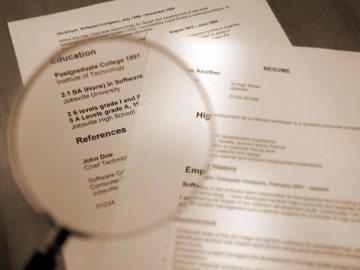Top 10 Things to Avoid Putting on a Job Application

For many organizations, a resume and cover letter are not enough for them to make a hiring decision. If this is the case, you may be asked to complete a job application as well. Don't treat a job application as a lesser component of the application process, however, as it can significantly influence a hiring manager's opinion of you.
Many companies use outdated processes that force you to manually enter the details that are already on your resume. While it is a hassle to retype your data, this is one of the secret opportunities of the job market. Manual entry in an online application gives you the opportunity perfectly tailor your job experience to the actual job you are applying for.
A recruiter will usually be swarmed with applications, so make sure yours stands out from the rest. Completing a job application with care will help persuade a hiring manager to take a chance on you. Knowing what to include, but especially what to avoid putting on your job application will help direct you down the right path in your job search.
10 Things to Avoid Putting on a Job Application
-
Information that is different from the information on other application materials
If the information on your job application (company name, employment dates, and other basics) doesn't match the information on your resume or cover letter, then this will be a red flag to a hiring manager. Be consistent, credible, and trustworthy by including the same information on each job application material. You can use the application to elaborate and tailor your descriptions of the work you did.
-
Leaving areas of your application blank
Job applications are designed to be fully completed by applicants. Even if different sections of the application intersect and overlap, it is vital to fill out every section with information. This will help to fully inform an employer about your knowledge, skills, and experience.
-
Untailored descriptions of skills and past job experience
In your job search, it is imperative to make sure you tailor your application materials to the employer and job description that you apply for. Sending a general, non-tailored application will give the impression that you haven't taken the time or effort to research how your knowledge, skills, and experience benefit the employer. Include the skills and past job experiences that will be of interest to a hiring manager and ensure that they are relevant.
-
Extended descriptions of your previous work experience
Don't overdo it when you are describing your previous roles and experiences. Be concise and to the point to give an employer the most valuable information about yourself. Writing too much will dissuade an employer from reading past the first sections of your application as there is too much to decipher.
-
Any irrelevant or false information
Only include information that is relevant to your current career and to the job you are applying to. If an employer thinks that you are lying on your application, it will blow your chances of landing the job. You can also lose credibility within the industry you are applying to if false information is exposed.
-
Unrealistic salary expectations (too high or low)
Whether your demands are too high or low, it can signify to an employer that you may not know much about the job you are applying for. Research similar jobs comprehensively and come up with a figure that aligns with the industry standard salary of the position.
-
Unprofessional links or personal details
Is your email amylovescatz@hotmail.com? If your email has an unprofessional name, it is time to create a new account with a professional name to add to your job application. Anticipate and avoid the embarrassment before you contact an employer.
-
Writing errors
When filling out your job application, be conscious of your writing to make sure there are no spelling or grammatical errors. Tools such as Grammarly are fantastic for checking any mistakes that may be in your application. This doesn't just apply to your job application, but all materials used in your job search.
-
Pictures
Jobs in industries such as modeling, or the arts may require some pictures on job applications. For the vast majority of jobs, an employer shouldn't require a photo of you or anything else in your job application. Remove them from your application unless specified otherwise.
-
Negative reasons for leaving a previous job
Many job applications include a section about the reasons that you left previous roles. Leaving any negative reasons for leaving a previous job may leave an employer questioning your mindset and performance. Take the positive of moving to a job that presents a different challenge rather than denouncing your previous employer.


